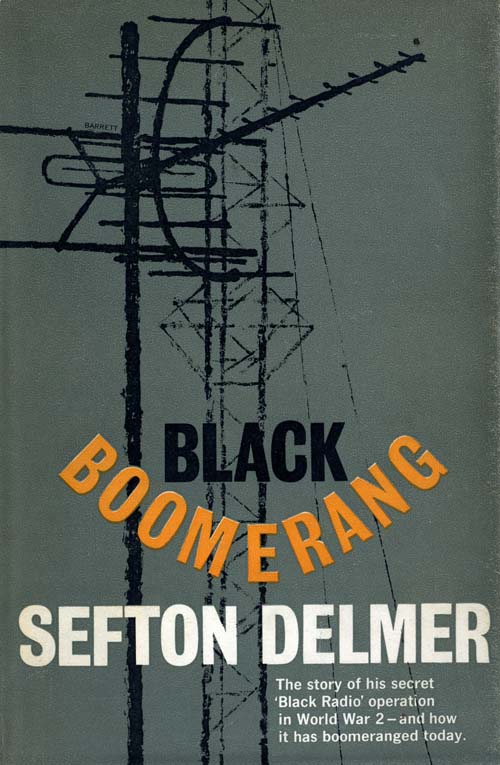
I have just been listening
to the afternoon play on Radio 4, not only because it was a dramatization of
part of Muriel Sparks’ life, but also because I caught on a trailer for it,
that it was about disinformation during the Second World War in Britain.
With
a bump I was taken back to a library book I took out when I was in school and
the name Sefton Delmer came back to me.
It took a bit of Google searching, but the title of the book that I read
(I actually recognized the cover!) was called Black Boomerang, written by Sefton Delmer the head of our black
propaganda efforts during the war and published in 1962, so I was remembering a
book I read over half a century ago.
Although most of the details of the book
are long lost to my retrieval system, the name of the author is something that
has always stayed with me, together with thoughts about the morally ambiguous
basis for black propaganda. I have used
this concept as something that linked usefully in to my work in school with
media, advertising and indeed literature in the ways that all of them attempt
to persuade and convince.
The Radio 4 play was a fairly
insubstantial piece of fluff, but it did raise a number of interesting ethical
dilemmas and, although the ending of the play was flip and facile (even if it
was true, which given the subject matter of the play etc etc) but has provoked
me into writing.
It has been famously reported that when
Sir Strafford Cripps found out what Sefton Delmer was doing, he wrote to
Anthony Eden the Foreign Secretary and said, “If this is the sort of thing that
is needed to win the war, why, I’d rather lose it.” Perhaps, even at the time, this attitude was
considered a trifle precious, after all we were fighting ‘total war’ that
seemed to justify anything – and against a foe whose moral worth was
demonstrably low. But, and there is
always a but, if you lose your own moral standards in fighting someone with low
moral standards how are you better than they are? The ends justify the means is Machiavellian,
literally!
And the times in which we are living make
you wonder if the pioneering work of Sefton Delmer in the black arts of
information manipulation are not now the normal way that all governments behave
– but openly and with a complete lack of shame and a totally confusing
acceptance of fabricated lies are truth and reality.
The present governmental attitudes towards
information about the Coronavirus (or ‘Caronavirus’ to the idiot in the White
House) have much more to do with presentation than reality. We expect totalitarian regimes to hush up,
massage, lie, obfuscate, whitewash and bluster – but these techniques are all
too familiar to the degraded governments of the part-time British Prime
Minister and the full-time American golfer.
Given the state of truthfulness in the
political world today, perhaps I should re-read Black Boomerang to remind
myself of the techniques that are being used on me today. If you are interested, then all of Seton
Delmer’s books are available on-line at psywar.org.
In spite of the fact that I
sometimes use the weekend to justify laziness in getting up, today I got up for
my early morning swim and was rewarded with a lane of my own (eventually) and a
well-deserved cup of tea outside (in my coat, obviously) afterwards.
My post-swim cup of tea and
notebook use produced further ideas for the recalcitrant poem, or maybe another
completely different one. I will try and
mash the concepts together and find out what happens, though I think that I
have a title.
For the first time in my life I actually
thought about the phrase, “Now then!”
And wondered why its contradictory nature had never struck me
before. It can be used in different
circumstances and could mean anything from “Steady the Buffs!” to “That’s enough
of that!” to “Just wait until you hear what I have got to tell you!” to “Don’t
be nasty” and so on.
I liked it, when I thought about it, for
the way in which it links the present to the past in an easy colloquial
phrase. And ambiguity is always stimulating!
If you are interested in further discussion then I suggest you look at the site
https://english.stackexchange.com/questions/24882/the-origin-of-the-phrase-now-then
I will, however use the
phrase in my own way!

The major problem for me with this new/old
hobby is that I never can find enough free surfaces to allow the prints to dry
before I make other cuts and prints.
I think that I will have to ‘prepare’
backgrounds so that I have a ready supply of treated pages to use at
leisure.
Well, it’s worth a try and, as I always
say about my attempts at things artistic, “What have I got to lose but my
self-respect”!




